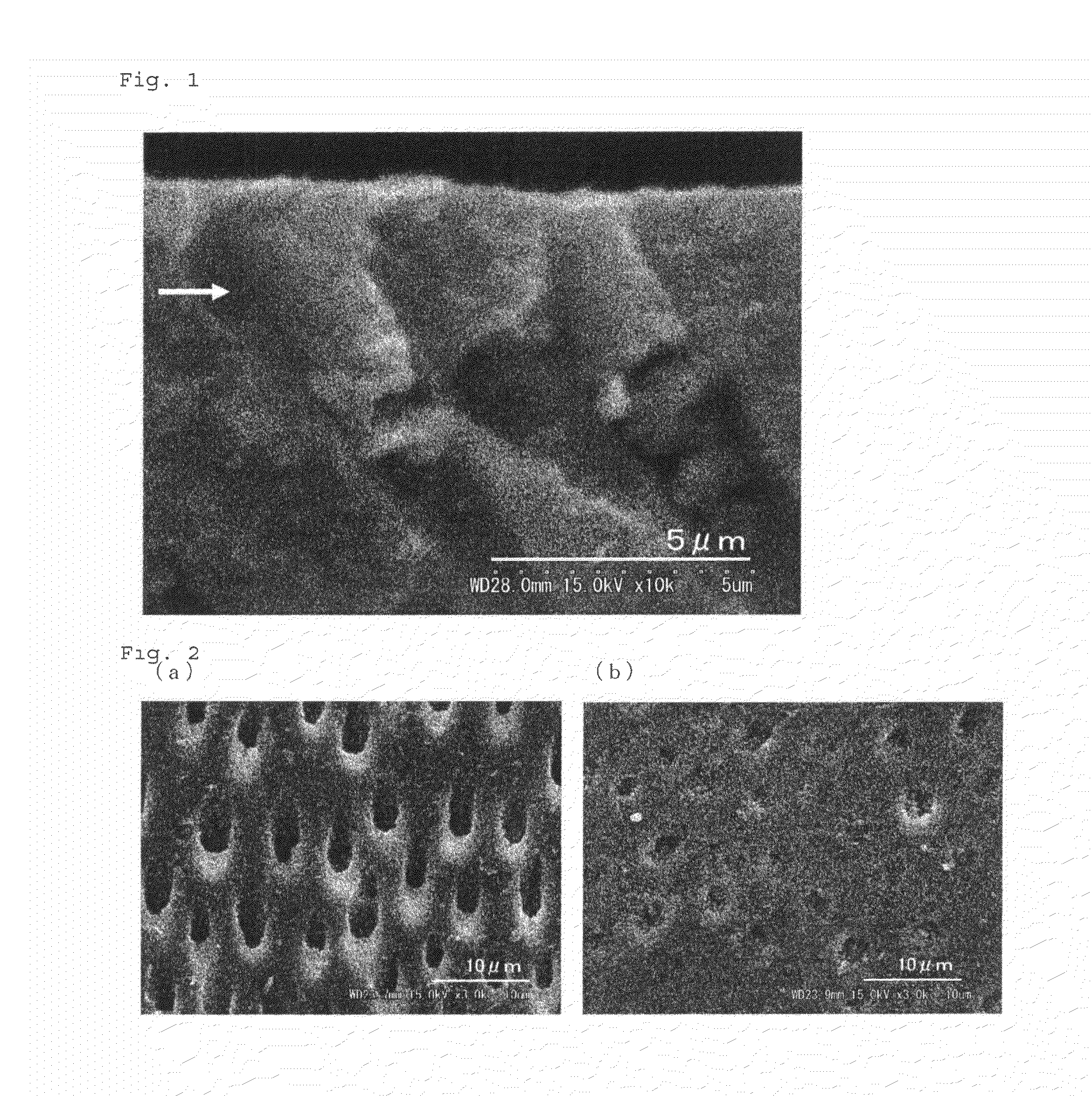Dentinal tubule sealant and method for producing the same
a technology of dentinal tubule and sealant, which is applied in the field of dentinal tubule sealant, can solve the problems of low mineral deposit ability of materials including calcium solubilizing agents, and the inability to disclose the possibility of obtaining dentinal tubule sealant with a high dentinal tubule inhibition ratio, and achieve the effect of imparting caries resistan
- Summary
- Abstract
- Description
- Claims
- Application Information
AI Technical Summary
Benefits of technology
Problems solved by technology
Method used
Image
Examples
examples
[0079]The present invention is explained below more concretely by way of Examples. In the Examples, regarding the average particle diameter of poorly-soluble calcium phosphate particles (A), particles of a phosphorus-free calcium compound (B), and particles of an alkali metal salt of phosphoric acid (D), measurement was conducted using a laser diffraction type particle size distribution analyzer (“SALD-2100” manufactured by Shimadzu Corporation), and a median diameter calculated from the result of the measurement was defined as the average particle diameter.
[Dentin Penetration Inhibition Ratio Evaluation]
(1) Production of Bovine Tooth for Dentin Penetration Inhibition Ratio Evaluation
[0080]A cheek-side dentin of a healthy bovine incisor tooth was trimmed with #80, #1000 sand papers by using a rotary grinder, so that a dentin disc about 1.5 cm in diameter and 0.9 mm in thickness was produced. The surface of the bovine tooth disc was further polished with wrapping films (#1200, #3000,...
examples 1 to 45
[0109]Dentinal tubule sealants were prepared in the above-described procedures (1) to (3) and then an initial dentin penetration inhibition ratio evaluation test and a long-term dentin penetration inhibition ratio evaluation test were performed. The evaluation results obtained are summarized in Tables 1 and 2.
(1) Production of Bovine Tooth for Morphological Evaluation
[0110]A cheek-side center of a healthy bovine incisor tooth was trimmed with #80, #1000 sand papers by using a rotary grinder, so that a 2 mm thick dentin plate with a cheek-side dentin exposed was produced. This cheek-side dentin surface was further polished with wrapping films (#1200, #3000, #8000, produced by Sumitomo 3M Ltd.) to be smoothened. This cheek-side dentin portion was masked with manicure with a window of a test portion as large as 7 mm in both the ordinate direction and the abscissa direction left unmasked, and then was air-dried for one hour. As to this bovine tooth, a solution prepared by diluting a 0.5...
example 46
[0114]A nonaqueous paste was prepared by mixing 20.5 g of DCPA: 1.1 μm, 0.5 g of Ca(OH)2: 5.2 μm, 4 g of Na2HPO4: 4.6 μm, 0.22 g of NaF, 0.5 g of Ar130, and 13.78 g of glycerol (produced by Wako Pure Chemical Industries, Ltd.). An aqueous paste was prepared by mixing 20.0 g of DCPA: 1.1 μm, 0.5 g of sodium saccharate (produced by Wako Pure Chemical Industries, Ltd.), 3 g of polyethylene glycol (Macrogol 400, produced by Sanyo Chemical Industries, Ltd.), 5 g of glycerol, 5.0 g of propylene glycol (produced by Wako Pure Chemical Industries, Ltd.), 0.05 g of cetyl pyridinium chloride monohydrate (produced by Wako Pure Chemical Industries, Ltd.), 3.5 g of Ar130, and 23.45 g of distilled water. A dentinal tubule sealant was prepared by adding 39.5 g of the nonaqueous paste prepared above and 60.5 g of the aqueous paste prepared above, and then mixing them. In the same manner as in Example 1, an initial dentin penetration inhibition ratio evaluation test and a long term dentin penetration...
PUM
| Property | Measurement | Unit |
|---|---|---|
| pH | aaaaa | aaaaa |
| pH | aaaaa | aaaaa |
| temperature | aaaaa | aaaaa |
Abstract
Description
Claims
Application Information
 Login to View More
Login to View More - R&D
- Intellectual Property
- Life Sciences
- Materials
- Tech Scout
- Unparalleled Data Quality
- Higher Quality Content
- 60% Fewer Hallucinations
Browse by: Latest US Patents, China's latest patents, Technical Efficacy Thesaurus, Application Domain, Technology Topic, Popular Technical Reports.
© 2025 PatSnap. All rights reserved.Legal|Privacy policy|Modern Slavery Act Transparency Statement|Sitemap|About US| Contact US: help@patsnap.com

